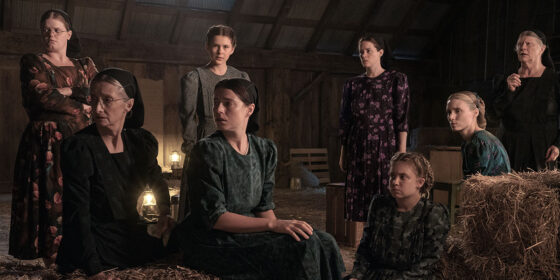TIFF 2022 | Women Talking (Sarah Polley, Canada) — Special Presentations

By Winnie Wang
The nocturnal attacks against the Mennonite girls and women, it turns out, weren’t ghosts or retributions for their sins, but a recurring collective nightmare in the form of repeated sexual assaults carried out by men armed with animal tranquillizers. After one assailant is identified and threatened with a scythe, the men of the colony are escorted into the city by police for their safety, leaving the women to determine their next steps: stay and fight, or leave. In a hayloft as debate hall, eight members of the Friesen and Loewen families gather to discuss their futures over the course of a day, considering the possibility of forgiveness, justice, and reform alongside their pacifist beliefs. August (Ben Whishaw), a male schoolteacher who can read and write, is tasked with the responsibility of producing a written artifact of their conversation.
In adapting Miriam Toews’ 2018 novel, Sarah Polley inherits the challenge of calibration: balancing practicalities with abstractions, the profound with the trivial, grief and sorrow with joy and hilarity in order to craft an animated discussion that resists platitudinous assertions. Indeed, Polley’s ensemble cast—comprised of Claire Foy, Jessie Buckley, Rooney Mara, Michelle McLeod, Sheila McCarthy, Judith Ivey, Liv McNeil, and Kate Hallett—depict differing shades of fury, hope, and resignation to reveal messy and often contradictory desires. And the two youngest members of the assembly, with their practical jokes and mischief and roaring laughter, offer not only moments of levity between impassioned monologues, but a reminder of futurity and the implications of the final decision. Beyond the performances, though, Women Talking lacks a certain nuance that distinguishes the source material from banal observations about the politics of sex and gender. The film races towards a swift resolution, seldom sparing time for digressions or subtlety with its muted visuals, lengthy exposition, and cuts to bloodstained nightgowns. Through heavy-handed direction, Polley leaves an artifact of her own that dilutes Toews’ exhilarating ideas to reproduce familiar arguments in the discursive arena.
Winnie Wang

